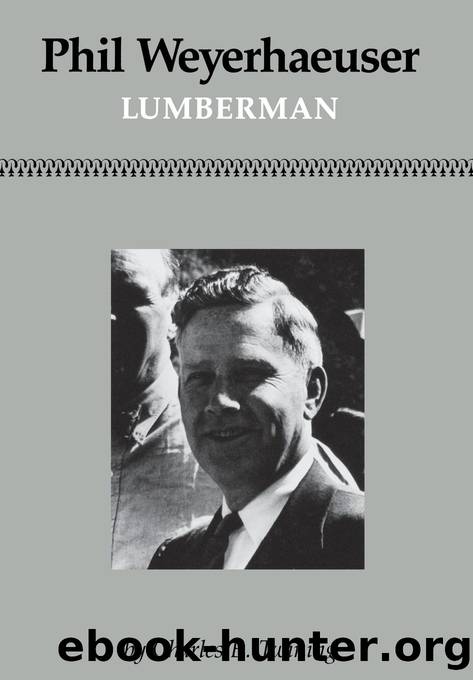Phil Weyerhaeuser by Charles E. Twining

Author:Charles E. Twining
Language: eng
Format: epub
Publisher: University of Washington Press
Published: 2017-03-15T00:00:00+00:00
CHAPTER 10
A Time for Tree Farming
As had become the custom, Bob Wolf and Phil received Christmas messages from Dr. Schenck, although the 1939 greeting came in card form, with personalized handwritten thoughts attached. Bob inquired of Phil just what his message from the German forester meant: âTry and find flowers at the edge of the desert.â Phil assumed that their friend was expressing his unhappiness in a manner that would pass censorship. Herr Schenckâs rationalizations of previous years were not repeated.
Far more cheering were the birthday greetings to her âPhilipâ from Aimee Lyford, now an elementary school principal in Elgin, Illinois. Almost forty years had passed since Miss Aimee had joined the family at Lake Nebagamon, and she recalled those days with fondness. Elizabeth wrote to her at least twice a year, and Aimee expressed pleasure at having received âChristmas greetings from all you three childrenâyou are still children to me.â
At the end of January 1940, Phil reported to the Timber Company directors that the final steps had been accomplished, and the company now had a controlling interest in the Washington Veneer Company of Olympia âon a basis which we believe will make it a good investment.â Business had generally improved far faster than even the more optimistic projections, and the cash balance grew substantially. Laird Bell foresaw trouble in this and suggested that they consider âputting it away in governments where it doesnât look so big and tempting.â Phil interpreted this as an indirect objection to the plywood deal, responding, âit may be that too much money on hand provokes attempts to spend itâand evidently you consider the plywood venture in that category.â But Phil assured him that he was convinced it was âa good deal, and hope that you will think so, too.â
Early April was a busy time. C. S. Chapman, the first graduate of the Yale Forestry School and chief forester with the Weyerhaeuser Timber Company since 1924, died suddenly on April 3, his sixtieth birthday. Negotiations were under way to purchase some 36,000 acres of Northern Pacific land for $400,000. As Phil explained to Uncle Fred, this was a âfine area of reproduction,â and the ownership would âgive us the logical preference in acquiring intermingled sections of Forest Service timber.â It was located conveniently to âour Upper Deschutes railroad,â and was a logical investment in every way. Within the week Phil had received word from all members of the Executive Committee, all in support of the purchase, and the thing was accomplished.
The war had first been felt in a direct fashion in the shipping end of the industry. Bill Peabody had been approached by brokers representing the British Ministry of Supply, and in early March Phil heard directly from a representative of J. F. Rafailovich and Company, whose cable address was ONEMIND. The message was short and to the point: âto find out whether you would entertain an offer to sell the S.S. Pennsylvania, or any of your steamers.â As Phil would admit to Bill Peabody,
Download
This site does not store any files on its server. We only index and link to content provided by other sites. Please contact the content providers to delete copyright contents if any and email us, we'll remove relevant links or contents immediately.
International Integration of the Brazilian Economy by Elias C. Grivoyannis(111059)
The Radium Girls by Kate Moore(12028)
Turbulence by E. J. Noyes(8049)
Nudge - Improving Decisions about Health, Wealth, and Happiness by Thaler Sunstein(7707)
The Black Swan by Nassim Nicholas Taleb(7129)
Rich Dad Poor Dad by Robert T. Kiyosaki(6633)
Pioneering Portfolio Management by David F. Swensen(6301)
Man-made Catastrophes and Risk Information Concealment by Dmitry Chernov & Didier Sornette(6019)
Zero to One by Peter Thiel(5802)
Secrecy World by Jake Bernstein(4753)
Millionaire: The Philanderer, Gambler, and Duelist Who Invented Modern Finance by Janet Gleeson(4478)
The Age of Surveillance Capitalism by Shoshana Zuboff(4293)
Skin in the Game by Nassim Nicholas Taleb(4249)
The Money Culture by Michael Lewis(4207)
Bullshit Jobs by David Graeber(4190)
Skin in the Game: Hidden Asymmetries in Daily Life by Nassim Nicholas Taleb(4007)
The Dhandho Investor by Mohnish Pabrai(3765)
The Wisdom of Finance by Mihir Desai(3747)
Blockchain Basics by Daniel Drescher(3583)
